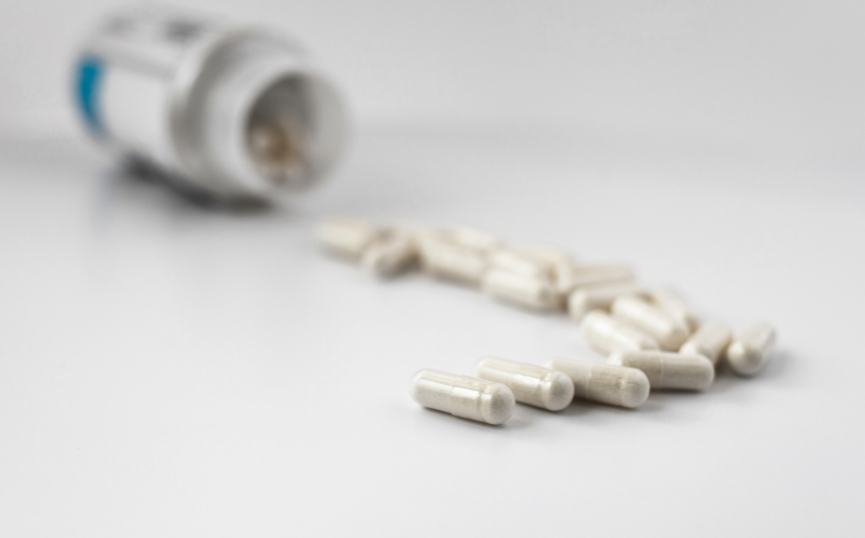Lithium Orotate – Effects, Side Effects, and Uses
Lithium orotate, as a mood-enhancing dietary supplement, is becoming increasingly popular among those seeking natural alternatives. Lithium is not only used in electronics but also in medicine. Many may wonder how lithium orotate differs from doctor-prescribed forms of lithium (carbonate, citrate). What effects can one expect from this supplement? In today’s article, we speak honestly about the effects and side effects of lithium orotate. Does lithium orotate truly have relevant health benefits, or not?

What is Lithium?
Lithium occurs in the human body as a trace element—an essential mineral that the body requires in very small doses (typically less than 100 milligrams per day) for normal functioning. Despite this, science does not recognize lithium as an essential nutrient vital for life.1
Like all minerals, the body cannot produce lithium on its own.1,2 Its role in the body remains largely speculative. The most researched and proven effect is its mood-enhancing properties. In clinical doses (as lithium carbonate or lithium citrate), it has long been used to treat bipolar disorder and severe depression.1
How Does Lithium Affect the Body?
In small doses (e.g., from natural sources like drinking water), it may exhibit mood-improving effects. Related to this, some epidemiological data suggest that low lithium levels in water could reduce depression and suicide rates in populations.3-9 However, the evidence here is not entirely clear, and it cannot be compared to pharmacological doses.
Lithium's mood-stabilizing effects can be explained on multiple levels. It increases levels of the happiness hormone (serotonin) and dopamine, which is responsible for motivation. The latter's decrease is strongly linked to depression and bipolar disorder. It also acts through other molecular pathways.10-14
There are also hypotheses about its neuroprotective (nervous system-protecting) properties. Laboratory and animal studies indicate that lithium may aid in neuron survival and regeneration.15-18

Lithium Orotate: How Does It Differ from Other Lithium Forms?
Lithium orotate is a salt form of lithium—a compound of lithium and orotic acid. Unlike lithium, the body produces orotic acid (as a byproduct of DNA synthesis).
The biggest question is perhaps why lithium orotate is available as a dietary supplement, while other forms of lithium are prescription-only.
The reason is simple: Lithium orotate in dietary supplements contains very small amounts of lithium, typically 1–5 mg of elemental lithium per capsule. For comparison, lithium carbonate medications prescribed for bipolar disorder can contain 600–1200 mg of elemental lithium per day.
Related to this, it's crucial to clarify why therapeutic lithium medications are prescription-only.
The therapeutic level of lithium is very close to its toxic level. This makes lithium easy to overdose. In such cases, serious side effects can occur: kidney damage, changes in thyroid function, hand tremors, weight gain, heart rhythm disturbances. Regular blood level monitoring is necessary for safe use. Furthermore, high-dose lithium is a central nervous system-affecting medication and should not be viewed simply as a mineral supplement.
The Effects of Lithium Orotate
Lithium has been used in psychiatry for decades, but there is limited large-scale, reliable clinical research on the effects of lithium orotate. Based on existing studies and experiences, low doses may offer the following benefits:
- Mood-balancing effect – may help with mild mood swings or anxiety
- Stress reduction – may support calmer nervous system function
- Improved sleep quality – some users report better rest
- Neuroprotective effect – experiments suggest it supports neuron health
It's important to note: These effects are not proven in large, controlled human trials, so results should be interpreted cautiously. Let's examine a few findings.
Studies on Lithium Orotate19-23
- Alzheimer's Disease and Neurodegenerative Disorders
A 2025 study found that lithium orotate supplementation reversed Alzheimer-like symptoms in mice and restored brain functions. The research suggests lithium orotate may aid in supporting neurons, maintaining synaptic connections, myelin formation, and increasing microglia activity, which removes cellular debris.
- Lithium Orotate and Brain Lithium Concentration
In a 2023 study, nine healthy men took 5 mg of lithium orotate daily for 28 days. The goal was to determine how very low-dose lithium affects lithium concentration in the brain.
- Lithium Orotate and Neuroprotective Mechanisms
A 2022 review details lithium's neuroprotective mechanisms, including reducing inflammation, oxidative stress, inhibiting apoptosis, and preventing mitochondrial dysfunction. Lithium's effects occur through two main signaling pathways: PI3/Akt/GSK3β and PI3/Akt/CREB/BDNF.
- Lithium Orotate in Treating Alcoholism
A 1986 study found lithium orotate useful in treating alcoholism. Among participants, ten had no relapse for over three years, and thirteen for one to three years.
- Toxicological Evaluation of Lithium Orotate
In a 2021 toxicological study, rats were given 0, 100, 200, or 400 mg/kg body weight of lithium orotate daily for 28 days. No toxic effects or target organ damage were found, so the highest observed no-adverse-effect level was set at 400 mg/kg body weight/day.
Side Effects of Lithium Orotate

Although side effects are rarer due to low doses, they may occur in some cases:
- slight hand tremors
- increased thirst, more frequent urination
- gastrointestinal complaints (nausea, diarrhea)
- fatigue and drowsiness.
Lithium orotate should not be used in cases of kidney disease, pregnancy, or breastfeeding. At high doses, lithium poisoning can develop, and continuous use may lead to accumulation in the body (even at such low doses). In healthy individuals taking 1-5 mg daily, the risk of accumulation is minimal. Caution is needed with long-term use or higher doses, especially in:
- those with kidney disease,
- the elderly,
- low salt intake (as sodium-lithium excretion is linked).*
* In the kidneys, transport proteins specialized for sodium reabsorption mistake lithium for sodium and transport it partially through the same pathways. If the body's sodium level is low (e.g., low salt intake, excessive sweating, diuretic use), the kidneys retain sodium more strongly.
If it contains such small amounts, is the effect just placebo?
Although lithium orotate contains less lithium than pharmaceutical forms, orotic acid may aid better absorption.22 This could explain its real biological effects, though the intensity and clinical significance remain uncertain.
Verdict – Is It Worth Taking?
Lithium orotate is a low-dose lithium form popular as a dietary supplement mainly for its mood-balancing and stress-relieving effects. While some users report positive experiences, scientific evidence is currently limited.
Let's rate the effect of lithium orotate supplements based on studies! On a scale from 1 to 10, where:
- 1: mild, barely noticeable calming herbs (e.g., chamomile tea)
- 10: very strong, consciousness-suppressing sedatives (e.g., barbiturates, high-dose propofol)
then lithium orotate would be around 4–5 in strength. This is similar to the effects of Omega-3 and high-dose magnesium supplementation.
Available in the Vitamin360 range is Oly Lithium Orotate, which contains 5 mg of elemental lithium. Do not exceed the recommended amounts during use.
Weighing the effects against side effects, if you decide to take lithium orotate as a supplement, consult a doctor first. Especially if you have any chronic conditions. Particular attention is needed for kidney issues and conditions involving low salt intake (high blood pressure, chronic kidney disease, heart failure, liver cirrhosis with ascites).
- Chokhawala K, Lee S, Saadabadi A. Lithium. [Updated 2024 Jan 14]. In: StatPearls [Internet]. Treasure Island (FL): StatPearls Publishing; 2025 Jan-.
- Morris AL, Mohiuddin SS. Biochemistry, Nutrients. [Updated 2023 May 1]. In: StatPearls [Internet]. Treasure Island (FL): StatPearls Publishing; 2025 Jan-. Available from: https://www.ncbi.nlm.nih.gov/books/NBK554545/
- Gonçalves C, Azevedo R, Couto C, Duro M, Santos A, Cainé L, Almeida A. Association Between Natural Lithium Exposure and Suicide Rate: An Ecological and Biomonitoring Study in Portugal. Nutrients. 2025 Apr 7;17(7):1283. doi: 10.3390/nu17071283. PMID: 40219040; PMCID: PMC11990145.
- Pichler EM, Fartacek C, Miller-Doebeling B, Walter M, Plöderl M. Too early to add lithium to drinking water? No association between lithium and suicides in a pre-registered Swiss study. J Affect Disord. 2024 Dec 15;367:598-605. doi: 10.1016/j.jad.2024.08.239. Epub 2024 Sep 5. PMID: 39242041.
- Fadaei A. An investigation into the association between suicide mortality rate and lithium levels in potable water: a review study. Int Clin Psychopharmacol. 2023 Mar 1;38(2):73-80. doi: 10.1097/YIC.0000000000000432. Epub 2023 Jan 18. PMID: 36719336.
- Liaugaudaite V, Raskauskiene N, Naginiene R, Mickuviene N, Sher L. Association between lithium levels in drinking water and suicide rates: Role of affective disorders. J Affect Disord. 2022 Feb 1;298(Pt A):516-521. doi: 10.1016/j.jad.2021.11.045. Epub 2021 Nov 17. PMID: 34800570.
- López Steinmetz LC, López Steinmetz RL, Diaz SL, Godoy JC. Lithium in drinking water, altitude, and suicide rates in rural areas of Argentinean Andes. Spat Spatiotemporal Epidemiol. 2021 Feb;36:100393. doi: 10.1016/j.sste.2020.100393. Epub 2020 Nov 18. PMID: 33509433.
- Barjasteh-Askari F, Davoudi M, Amini H, Ghorbani M, Yaseri M, Yunesian M, Mahvi AH, Lester D. Relationship between suicide mortality and lithium in drinking water: A systematic review and meta-analysis. J Affect Disord. 2020 Mar 1;264:234-241. doi: 10.1016/j.jad.2019.12.027. Epub 2019 Dec 19. PMID: 32056756.
- Palmer A, Cates ME, Gorman G. The Association Between Lithium in Drinking Water and Incidence of Suicide Across 15 Alabama Counties. Crisis. 2019 Mar;40(2):93-99. doi: 10.1027/0227-5910/a000535. Epub 2018 Jul 27. PMID: 30052075.
- Dandekar MP, Valvassori SS, Dal-Pont GC, Quevedo J. Glycogen Synthase Kinase-3β as a Putative Therapeutic Target for Bipolar Disorder. Curr Drug Metab. 2018;19(8):663-673. doi: 10.2174/1389200219666171227203737. PMID: 29283064.
- Beaulieu JM, Gainetdinov RR, Caron MG. Akt/GSK3 signaling in the action of psychotropic drugs. Annu Rev Pharmacol Toxicol. 2009;49:327-47. doi: 10.1146/annurev.pharmtox.011008.145634. PMID: 18928402.
- Price LH, Charney DS, Delgado PL, Heninger GR. Lithium and serotonin function: implications for the serotonin hypothesis of depression. Psychopharmacology (Berl). 1990;100(1):3-12. doi: 10.1007/BF02245781. PMID: 2404294.
- Belujon P, Grace AA. Dopamine System Dysregulation in Major Depressive Disorders. Int J Neuropsychopharmacol. 2017 Dec 1;20(12):1036-1046. doi: 10.1093/ijnp/pyx056. PMID: 29106542; PMCID: PMC5716179.
- Ashok AH, Marques TR, Jauhar S, Nour MM, Goodwin GM, Young AH, Howes OD. The dopamine hypothesis of bipolar affective disorder: the state of the art and implications for treatment. Mol Psychiatry. 2017 May;22(5):666-679. doi: 10.1038/mp.2017.16. Epub 2017 Mar 14. PMID: 28289283; PMCID: PMC5401767.
- Almeida OP, Singulani MP, Ford AH, Hackett ML, Etherton-Beer C, Flicker L, Hankey GJ, De Paula VJR, Penteado CT, Forlenza OV. Lithium and Stroke Recovery: A Systematic Review and Meta-Analysis of Stroke Models in Rodents and Human Data. Stroke. 2022 Sep;53(9):2935-2944. doi: 10.1161/STROKEAHA.122.039203. Epub 2022 Aug 15. PMID: 35968702.
- Ghanaatfar F, Ghanaatfar A, Isapour P, Farokhi N, Bozorgniahosseini S, Javadi M, Gholami M, Ulloa L, Coleman-Fuller N, Motaghinejad M. Is lithium neuroprotective? An updated mechanistic illustrated review. Fundam Clin Pharmacol. 2023 Feb;37(1):4-30. doi: 10.1111/fcp.12826. Epub 2022 Aug 30. PMID: 35996185.
- De-Paula VJR, Radanovic M, Forlenza OV. Lithium and neuroprotection: a review of molecular targets and biological effects at subtherapeutic concentrations in preclinical models of Alzheimer's disease. Int J Bipolar Disord. 2025 May 10;13(1):16. doi: 10.1186/s40345-025-00386-7. PMID: 40348943; PMCID: PMC12065699.
- Singulani MP, Ferreira AFF, Figueroa PS, Cuyul-Vásquez I, Talib LL, Britto LR, Forlenza OV. Lithium and disease modification: A systematic review and meta-analysis in Alzheimer's and Parkinson's disease. Ageing Res Rev. 2024 Mar;95:102231. doi: 10.1016/j.arr.2024.102231. Epub 2024 Feb 15. PMID: 38364914.
- Haussmann R, Noppes F, Brandt MD, Bauer M, Donix M. Lithium: A therapeutic option in Alzheimer's disease and its prodromal stages? Neurosci Lett. 2021 Aug 24;760:136044. doi: 10.1016/j.neulet.2021.136044. Epub 2021 Jun 10. PMID: 34119602.
- Pacholko AG, Bekar LK. Lithium orotate: A superior option for lithium therapy? Brain Behav. 2021 Aug;11(8):e2262. doi: 10.1002/brb3.2262. Epub 2021 Jul 1. PMID: 34196467; PMCID: PMC8413749.
- Murbach TS, Glávits R, Endres JR, Hirka G, Vértesi A, Béres E, Szakonyiné IP. A toxicological evaluation of lithium orotate. Regul Toxicol Pharmacol. 2021 Aug;124:104973. doi: 10.1016/j.yrtph.2021.104973. Epub 2021 Jun 17. PMID: 34146638.
- Nieper HA. The clinical applications of lithium orotate. A two years study. Agressologie. 1973;14(6):407-11. PMID: 4607169.
- Devadason P. Is there a role for lithium orotate in psychiatry? Aust N Z J Psychiatry. 2018 Dec;52(12):1107-1108. doi: 10.1177/0004867418810185. Epub 2018 Nov 8. PMID: 30404535.



